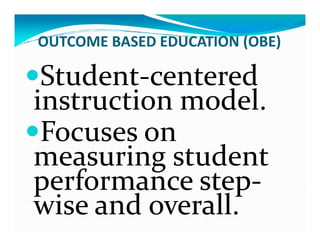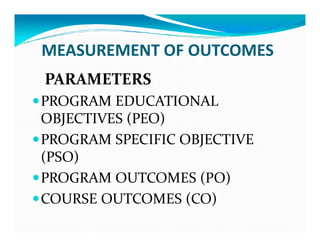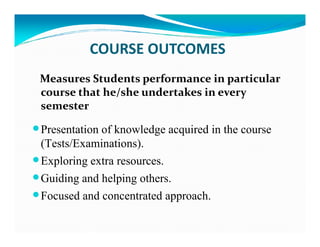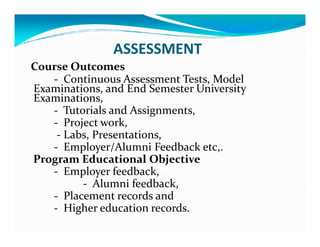OUTCOME BASED EDUCATION - OBE
- 2. OUTCOME BASED EDUCATION (OBE) Student-centered instruction model. Focuses onFocuses on measuring student performance step- wise and overall.
- 3. What are Outcomes? ON COMPLETION OF A PROGRAM AND AFTER 4 – 5 YEARS OF GRADUATIONGRADUATION KNOWLEDGE SKILLS BEHAVIOUR ATTITUDES
- 4. NEED TO ADOPT OBE Entry and advancement of technology in Education. Change in Mentality (Paradigm Shift) To Prove Quality Shift) To Prove Quality Increase in Competitiveness. Social Responsibility Create jobs and reducing dependency on job.
- 5. MEASUREMENT OF OUTCOMES PARAMETERS PROGRAM EDUCATIONAL OBJECTIVES (PEO)OBJECTIVES (PEO) PROGRAM SPECIFIC OBJECTIVE (PSO) PROGRAM OUTCOMES (PO) COURSE OUTCOMES (CO)
- 6. PROGRAM EDUCATIONAL OBJECTIVES (PEO) AFTER 4-5 YEARS OF GRADUATION Heights gained in an organization Social StatusSocial Status Involvement in Solution finding community - Entrepreneur Motivation for young generation Active Alumnus
- 7. PROGRAM SPECIFIC OBJECTIVE (PSO) IMMEDIATELY AFTER GRADUATION Placement - On Campus or Off Campus. Multi Skilling and Multi tasking.Multi Skilling and Multi tasking. Ready to face challenges - Confident Personality. Focused approach. Ready to guide juniors.
- 8. PROGRAM EDUCATIONAL OBJECTIVES After completion of the program, a Mechanical Engineering graduate will be able to : Work independently as well as in team. Follow professional ethics and codes of conduct.Follow professional ethics and codes of conduct. Involve in continuous learning process. Contribute to the society on vital issues. Expertise on use of latest technologies . Careers in industries and research organizations. Become a successful Entrepreneur.
- 9. PROGRAM OUTCOMES In the process of becoming a graduate in college, students are expected to know: High level of understanding in basic scientific principles and laws. Latest trends and use of technology in their discipline. Knowledge of Interdisciplinary domains. Latest trends and use of technology in their discipline. Knowledge of Interdisciplinary domains. Application of acquired knowledge and involvement in interdisciplinary projects. Involvement in extra-curricular activities. Access to villages for analysis and projection of problems. Utilization of available resources (Online and Offline) for academic growth.
- 10. COURSE OUTCOMES Measures Students performance in particular course that he/she undertakes in every semester Presentation of knowledge acquired in the coursePresentation of knowledge acquired in the course (Tests/Examinations). Exploring extra resources. Guiding and helping others. Focused and concentrated approach.
- 11. ASSESSMENT Course Outcomes - Continuous Assessment Tests, Model Examinations, and End Semester University Examinations, - Tutorials and Assignments, - Project work,- Project work, - Labs, Presentations, - Employer/Alumni Feedback etc,. Program Educational Objective - Employer feedback, - Alumni feedback, - Placement records and - Higher education records.
- 12. BLOOM’S TAXONOMY DESIGNING OF CURRICULUM AND SYLLABUS













